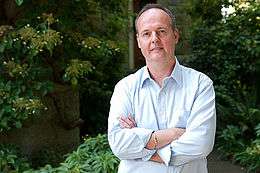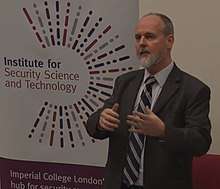Bill Durodié
| Professor Bill Durodié | |
|---|---|
 In Victoria, British Columbia, Canada, July 2012 |
Professor Bill Durodié is Chair of Risk and Security in International Relations and a former head of the Department of Politics, Languages and International Studies at the University of Bath, UK.[1] His inaugural professorial lecture there: The Politics of Risk and Resilience - Fear and Terror in a World without Meaning, was delivered on 29 October 2015.[2][3] In June 2016, rejecting all of the official campaigns, he argued on the grounds of democratic accountability and moral autonomy for the UK to give up its membership of the European Union.[4][5] He noted soon after the vote that, despite the largest mandate in British history, politicians and others would seek to deliver Brexit in name alone, but not in spirit.[6]
He was formerly Professor in the School of Humanitarian Studies at Royal Roads University in Victoria, British Columbia,[7] where he was Program Head for the Conflict Analysis and Management programs. Before that he held positions coordinating the Homeland Defence research programme and then the Health and Human Security research programme within the S. Rajaratnam School of International Studies of Nanyang Technological University in Singapore,[8] as well as in the Department of Defence Management and Security Analysis at Cranfield University, part of the Defence Academy of the United Kingdom at Shrivenham,[9] and in the War Studies Group of King's College London.[10]
In 2014 he was appointed as a Visiting Professor to CELAP – the China Executive Leadership Academy Pudong – one of China's top four national 'Party Schools', in Shanghai - a position officially renewed in 2018.[11][12][13] He was also an Associate Fellow of the International Security Programme at Chatham House - Europe's leading think-tank - in London for over a decade.[14]

His main research interest is to examine the causes and consequences of contemporary perceptions of risk, as well as how these are framed and communicated across a wide range of contemporary social issues. His work explores the limitations of risk management and of the so-called precautionary principle. He has questioned the motivations behind the growing demand to engage the public in dialogue and decision-making in relation to science.[15] He has also sought to draw attention to the parallels between Islamist terrorism and contemporary Western nihilism, noting that many who engage in the former draw their roots from the latter and specifically stating that 'Islam, for them at least, was more a motif than a motive'.[16]
He publicly defended the need for BP to continue its exploration work in the Gulf of Mexico at the time of the Deepwater Horizon oil spill,[17] and he supported the initial response of the Japanese authorities to the Fukushima Daiichi nuclear power plant emergency.[18][19] On the other hand, he has questioned the dynamic behind environmental campaigns against pulp and palm-oil producers in Indonesia,[20] and openly challenged the World Health Organization in relation to their declaration of the 2009 flu pandemic,[21] as well as the British government's interpretation of the implications of the 2011 England riots.[22]
His work proposes that Securitization (international relations) theory is too limited a framework through which to understand the British government's new Prevent Duty.[23] This latter imposes new obligations on public bodies to tackle so-called Radicalization, which he proposes is better understood as being driven by a process of disengagement.[24] He has also addressed what he sees as the demise of strategic thinking and a concomitant crisis of diplomacy, most recently evidenced by the responses of senior British government ministers to the Sergei Skripal, former-spy poisoning episode in the UK.[25]

Durodié was educated at the Royal College of Science, part of Imperial College London, where he studied Physics. After completing a final year undergraduate project to map different types of supernovae onto the Morphological Catalogue of Galaxies, he was invited to start a PhD in Astronomy at the University of Manchester under the supervision of Professor Franz Daniel Kahn. Accordingly, his first research publication was in theoretical astrophysics,[26] based on a paper he presented at Princeton University in 1986.[27]
He then changed course, first pursuing a career in teaching (becoming Head of Maths at two inner-city comprehensive schools) and then urban regeneration (working in both the public and private sectors). During this time he also studied for a Master's degree in European Social Policy at the London School of Economics, and subsequently embarked on another PhD, this time in Politics, at the University of Oxford under the supervision of Professor Christopher Hood. There, shortly after the September 11 attacks in 2001, he met Professor Sir Lawrence Freedman with whom he helped develop and then coordinated an ESRC funded project to study the responses to those events in collaboration with various researchers, including Professor Sir Simon Wessely.
Having left Oxford he completed his doctorate in Risk Communication through the Centre for Decision Analysis and Risk Management in the School of Health and Social Sciences of Middlesex University (UK),[28] with Professor John Adams (geographer) acting as an external examiner.
His publication list includes articles in leading journals,[29] and on the reading lists of internationally recognized universities[30][31][32][33] – as well as a noted media profile from both writing press commentaries and appearing in broadcasts. He featured in the 2004 BBC British Academy of Film and Television Arts award-winning documentary series produced by Adam Curtis; 'The Power of Nightmares: The Rise of the Politics of Fear'.[34] His appearance prompted The Guardian newspaper journalist Madeleine Bunting to describe him as 'one of the most perceptive commentators featured in the series'.[35]
Durodié was one of the founding members of the Manifesto Club,[36] a network of individuals originally established to celebrate human achievement and challenge social, cultural and political pessimism. He is a regular speaker at the annual Battle of Ideas festival in London,[37][38] and he gave the opening key-note address to the Society for Risk Analysis Europe Conference in 2016.[39] On 15 November 2017, following in the steps of former US Secretary for Homeland Security Michael Chertoff and the UK Minister of State for Universities and Science David Willetts, he became the 8th person and first alumnus to give the annual Vincent Briscoe Lecture to the Institute for Security Science and Technology at Imperial College London.[40][41]
Selected journal articles
- Terrorism and post-traumatic stress disorder, The Lancet Psychiatry, available online from 16 October 2018
- Theory informed by practice. Application informed by purpose. Why to understand and manage risk, cultural context is the key, Safety Science, Vol.99, No.2, 2017
- Remaking Bandung 60 Years On, Global Change, Peace & Security, Vol.28, No.3, 2016
- Securitising Education to Prevent Terrorism or Losing Direction?, British Journal of Educational Studies, Vol.64, No.1, 2016
- War on Terror or a Search for Meaning?, US Joint Chiefs of Staff/Department of Defence Strategic Multi-Layer Assessment Occasional White Paper, September 2013
- The Changing Nature of Riots in the Contemporary Metropolis: From Ideology to Identity, Journal of Risk Research, Vol.15, No.4, 2012
- H1N1 – The Social Costs of Élite Confusion, Journal of Risk Research, Vol.14, No.5, 2011
- Reconciling Growing Energy Demand with Climate Change Management, Global Change, Peace & Security, Vol.23, No.2, 2011
- H1N1 – The Social Costs of Cultural Confusion, Global Health Governance, Vol.4, No.2, 2011
- Human Security – A Retrospective, Global Change, Peace & Security, Vol.22, No.3, 2010
- Fear and Terror in a Post-Political Age, Government & Opposition, Vol.42, No.3, 2007
- Suicide Bombers v Sexual Abusers: A Battle of Depravity or Western Fixations?, Security Journal, Vol.20, No.3, 2007
- Risk and the Social Construction of 'Gulf War Syndrome', Philosophical Transactions of the Royal Society B, Vol.361, No.1468, 2006
- Public Panic and Morale: World War Two Civilian Responses Re-Examined in the Light of the Current Anti-Terrorist Campaign, (with Edgar Jones, Robin Woolven and Simon Wessely) Journal of Risk Research, Vol.9, No.1, 2006
- The Limitations of Risk Management in Dealing with Disaster, Politik, Vol.8, No.1, 2005
- Facing the Possibility of Bio-Terrorism, Current Opinion in Biotechnology, Vol.15, No.3, 2004
- Civilian Morale during World War Two: Responses to Air-Raids Re-Examined, (with Edgar Jones, Robin Woolven and Simon Wessely), Social History of Medicine, Vol.17, No.3, 2004
- Limitations of Public Dialogue in Science and the Rise of New 'Experts', Critical Review of International Social and Political Philosophy, Vol.6, No.4, 2003
- The True Cost of Precautionary Chemicals Regulation, Risk Analysis, Vol.23, No.2, 2003
- Resilience or Panic? The Public's Response to a Terrorist Attack, (with Simon Wessely) The Lancet, Vol.360, No.9349, 2002
References
- ↑ University of Bath Staff Profile
- ↑ Inaugural Lecture Notice
- ↑ Lecture Recording
- ↑ University of Bath, School of Management, Brexit Debate
- ↑ The Conversation - £4,300 to quit the EU? Bring me my cheque book
- ↑ Are politicians "kicking the Brexit ball into the long grass"?
- ↑ Royal Roads University Bio
- ↑ RSIS Centre for Non-Traditional Security Studies – People
- ↑ The Defence Academy Journal
- ↑ King’s College London Archive
- ↑ BILL DURODIé受聘担任学院兼职教授
- ↑ CELAP – Bill Durodié Appointed as CELAP’s Visiting Professor
- ↑ University of Bath - Professor Bill Durodié made Visiting Professor in China
- ↑ Chatham House Staff
- ↑ Times Higher Education Supplement – Why I ... think a dialogue with the public will undermine science
- ↑ Reconstruction Vol.11, No.4 Post-9/11 Nihilism and the Mission for Meaning
- ↑ Beyond Petroleum – The Limits of Risk Management
- ↑ Today – Disaster Hacks should stick to the facts
- ↑ Today – Sounding worse, when things are really getting better
- ↑ The Jakarta Post – Friction and vested interests in pulp and palm-oil production
- ↑ WHO’s learned nothing from the swine-flu panic?
- ↑ Journal of Risk Research Vol.15, No.4 – The Changing Nature of Riots in the Contemporary Metropolis: From Ideology to Identity
- ↑ Prevent Duty Guidance
- ↑ Leeds Salon - Radicalisation and Security
- ↑ The Lost Art Of Diplomacy
- ↑ Towards a Self-Consistent Model of a Galaxy
- ↑ Structure and Dynamics of Elliptical Galaxies
- ↑ Middlesex University Research Repository
- ↑ Personal Website – Publications
- ↑ Harvard University, The Meaning of Madness – Course Outline
- ↑ University College London, Policy Issues in the Life Science – Course Outline
- ↑ Universite du Quebec, Departement de Science Politiques – Descriptif du Cours
- ↑ University of Ottawa, Security and Conflict – Course Outline
- ↑ The Nightmare Delusion
- ↑ The Guardian – The Age of Anxiety by Madeleine Bunting
- ↑ Reason – Reclaiming the Enlightenment
- ↑ Speaker Profile
- ↑ Battle of Ideas
- ↑ SRA-Europe Conference 2016
- ↑ Big Data needs Big Ideas
- ↑ Research must transcend ‘dystopian mindset’ of the past half-century